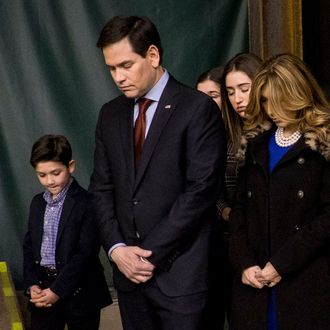
If Marco Rubio runs more strongly than expected in Tuesday’s Nevada caucuses, one of the first things observers will ask is whether he did particularly well among one disproportionately active demographic group — the 4 percent of Nevadans who belong to the Church of Jesus Christ of Latter-day Saints. And then we’ll all try to figure out whether Mormons participated at anything like the rates they did in 2008 and 2012, when they constituted about a quarter of Republican caucusgoers. If LDS folk do turn out and Rubio does benefit, figuring out why could be tricky. Did Mormons buy the rumors that their fellow church member Mitt Romney — who drove the heavy turnout in the last two caucuses — was about to endorse Rubio? Are orderly Mormons uncomfortable with Donald Trump’s erratic and flamboyant nature or with Ted Cruz’s intense Evangelical affiliation? Or did the Rubio campaign’s subtle efforts to remind Nevada Mormons he was one of them as a child growing up in Las Vegas pay off?
Should this last explanation look likely, Rubio should prepare himself for some fresh and perhaps not very friendly attention paid to his religious identity. His ideology, certainly, has ranged from tea-party conservative to Establishment moderate and back, depending on his particular needs. Less obviously, his religious affiliation has changed as well. He reportedly returned to his ancestral Catholic faith even before his family moved back to South Florida, and that choice may have even influenced his parents’ decision to do the same. But as an adult he has been seen regularly in the pews of an Evangelical Protestant church as well as at Mass. Is he in danger of looking as flippy-floppy on God as he is on, say, immigration reform?
That is a matter of opinion, and of future intense discussion, no doubt, if Rubio gets close to the GOP presidential nomination. One extensive analysis of Rubio’s faith suggests he’s a good representative of the church-shopping, nontheological type of Christianity that’s on the rise in the 21st century. And another argues that like former Louisiana governor (and former rival candidate) Bobby Jindal, Rubio is part of an emerging faith community of Evangelical Catholics that sharply depart from Church tradition by embracing free-market economics in place of Catholic social-justice traditions while emphasizing conservative common grounds on issues like abortion, same-sex marriage, and what they perceive as religious liberty.
However you slice it, Rubio’s unusual religious life and background feed his enemies’ suspicions of opportunism and a lack of rigor. Just today, Ted Cruz’s press secretary, Rick Tyler, was forced to resign after spreading a false report (based on a murky video) that Rubio had mocked the Bible being read by a Cruz staffer as “not having many answers.” Turns out Rubio actually said the Evangelically correct thing: that the Good Book had “all the answers.” So he wins this round of religious inquisition. But he will be watched every Sunday and every time he invokes his complicated faith.






























